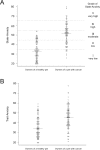Depression and anxiety in pet owners after a diagnosis of cancer in their pets: a cross-sectional study in Japan
- PMID: 30782907
- PMCID: PMC6368008
- DOI: 10.1136/bmjopen-2018-024512
Depression and anxiety in pet owners after a diagnosis of cancer in their pets: a cross-sectional study in Japan
Abstract
Objective: To determine the presence and predictors of depression and anxiety in pet owners after a diagnosis of cancer in their pets.
Design: Cross-sectional study.
Setting: A veterinary medical centre specialised in oncology for dogs and cats and two primary veterinary clinics in Japan.
Participants: The participants for analysis were 99 owners of a pet with cancer diagnosis received in the past 1-3 weeks and 94 owners of a healthy pet.
Main outcome measures: Self-reported questionnaires were used to assess depression and anxiety. Depression was assessed using the Center of Epidemiologic Studies Depression Scale, and anxiety was measured by using the State-Trait Anxiety Inventory-Form JYZ.
Results: Depression scores were significantly higher in owners of a pet with cancer than owners of a healthy pet, even after adjustment for potential confounders (p<0.001). Within the owners of a pet with cancer, depression was significantly more common in those who were employed than those who were unemployed (p=0.048). State anxiety scores were significantly higher in owners of a pet with cancer than owners of a healthy pet, even after adjustment for potential confounders, including trait-anxiety scores (p<0.001). Furthermore, in owners of a pet with cancer, state anxiety was higher in owners with high trait anxiety (p<0.001) and in owners whose pets had a poor prognosis (p=0.027).
Conclusion: The results indicate that some owners tended to become depressed and anxious after their pets had received a diagnosis of cancer. Employment may be a predictor of depression. High trait anxiety and a pet with a poor prognosis may increase owners' state anxiety. Including the pet in a family genogram and attention to the pet's health condition may be important considerations for family practice.
Keywords: anxiety; depression; family genogram; family practice; pet cancer.
© Author(s) (or their employer(s)) 2019. Re-use permitted under CC BY-NC. No commercial re-use. See rights and permissions. Published by BMJ.
Conflict of interest statement
Competing interests: MM received a lecture fee from the Japan Small Animal Medical Center, MM is an adviser of the Centre for Family Medicine Development practice-based research network, MM received a lecture fee and lecture travel fee from the Centre for Family Medicine Development, MM received a grant from the Japan Society for the Promotion of Science and MM is a Program Director of the Jikei Clinical Research Program for Primary-care.
Figures


References
-
- Ministry of Health, Labour and Welfare, Japan. Live births specified on report of vital statistics in FY2010. https://www.mhlw.go.jp/english/database/db-hw/FY2010/live_births.html (accessed 18 Oct 2018).
-
- Japan Pet Food Association. Industry’s annual national pet owner survey, 2015. In Japanese.
Publication types
MeSH terms
LinkOut - more resources
Full Text Sources
Medical
Molecular Biology Databases
Miscellaneous
